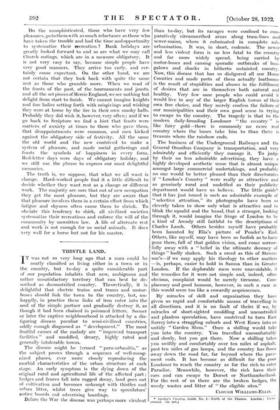THISTLE LAND.
IT was not so very long ago that a man could be neatly classified as living either in a town or in the country, but to-day a quite considerable part of our population inhabits that new, ambiguous and rather unsatisfactory territory that can best be de- scribed as decountrified country. Theoretically, it is delightful that electric trains and trams and motor- buses should link the town to the country, but, un- happily, in practice these links of iron enter into the soul of the simple partner and gradually destroy it, as though it had been chained in poisoned fetters. Sooner or later the captive neighbourhood is attacked by a dis- figuring disease peculiar to semi-civilized countries, oddly enough diagnosed as " development." The most fruitful causes of the malady are " improved transport facilities " and muddled, dreary, highly rated and generally intolerable towns.
The disease might be termed " para-urbanitis," as the subject passes through a sequence of well-recog- nized phases, ever more closely reproducing the morbid characteristics of the urban structure at each stage. An early symptom is the dying down of the original rural and agricultural life of the affected part ; hedges and fences fall into ragged decay, land. goes out of cultivation and becomes unkempt with thistles and urban litter, whilst -trees give way to speculators' Notice boards and advertising hoardings.
Before the War the disease was perhaps more virulent than to-day, but its ravages were confined to com- paratively circumscribed areas along tram-lines and sewer-mains, where it culminated in complete sub- urbanization. It was, in short, endemic. The newer and less violent form is no less fatal to the country and far more widely spread, being carried by motor-buses and causing sporadic outbreaks of bun- galows and shacks in hitherto untainted country.
Now, this disease that has so disfigured all our . Home Counties and made parts of them actually loathsome is the result of stupidities and abuses in the fulfilment of desires that are in themselves both natural and healthy. Very few sane people who could avoid it would live in any of the larger English towns of their own free choice, and they merely confess the failure of our municipalities and their own good sense in trying to escape to the country. The tragedy is that to the modern daily-breading Londoner " the country " is like fairy gold—there is commonly no more real country where the buses take him to than there is treasure where the rainbow ends.
The business of the Underground Railways and the General Omnibus Company is transportation, and very admirably and efficiently they manage it. To judge by their no less admirable advertising, they have a highly developed aesthetic sense that is almost unique amongst large commercial undertakings, and probably no one would be better pleased than their directorates if " London's Country " were really as attractive and as genuinely rural and undefiled as their publicity department would have us believe. The little guide* that it has just issued is such an admirable example of " selective attention," its photographs have been so cleverly taken to show only what is attractive and to blink the squalid and the banal, that a stranger, looking through it, would imagine the fringe of London to be a kind of Arcady still faithful to the descriptions of Charles Lamb. Others besides myself have probably been haunted by, Elia's picture of Ponder's End.
Others, like myself, may have been so foolish as to have gone there, full of that golden vision, and come sorrow- fully away with a " belief in the ultimate decency of things " badly shaken. Such a creed as this of Steven- son's—if we may apply his theology to other matters —is, perhaps, easier to hold in Samoa than in Greater London. If the deplorable mess were unavoidable, it the remedies for it were not simple and, indeed, often obvious, complaint would be merely tiresome. Corn. placency and good humour, however, in such a case as this would seem too like a cowardly acquiescence.
By miracles of skill and organization they have given us rapid and comfortable means of travelling in all directions, and it is no fault of theirs if we, by miracles of short-sighted muddling and uncontrolled and planless speculation, have contrived to turn East Surrey into a straggling suburb and West Essex into an untidy " Garden Slum." Once a shilling would take you into the country. You travelled uncomfortably and slowly, but you got there. Now a shilling takes you swiftly and comfortably over ten miles of asphalt, past ten miles of gas lamps, and the country has flown away down the road far, far beyond where the pave- ment ends. It has become as difficult for the poor Londoner to reach the country as for the rich to enter Paradise. Meanwhile, however, the rich have their cars and can escape to Dorset or Northumberland. For the rest of us there are the -broken hedges, the weedy wastes and litter of " the eligible sites."
CLOUGH WILLIAMS-ELLIS.
• London's Colt:Vim, Guide No. 1—North of the Thames. London: Cider- aromul. Its, net.)










































 Previous page
Previous page